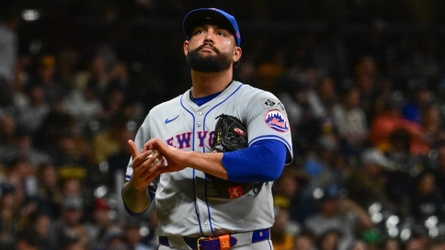In his mind, Carlos Mendoza thought he had the late innings set up the way he wanted, and in theory, the strategy was fine: three set-up relievers who have been pitching well to go an inning each and get the ball to Edwin Diaz for the ninth.
The problem was Mendoza had no Plan B when he needed it, and that cost him.
So for all the credit I gave him for outmanaging Pat Murphy in Game 1 of this series, I have to put some of the blame on Mendoza for the Mets’ 5-3 loss in Game 2 to the Brewers in Milwaukee Wednesday night, which sets up a winner-take-all Game 3 on Thursday.
Maton gave up two home runs in the eighth inning to blow the game, but it wasn’t so much the choice of relievers that was the issue as the decision to leave Maton in even after the first three hitters hit rockets off him at 100 mph or higher off the bat.
Mendoza surely saw it. It’s well-documented that he’s a manager who trusts his eyes to dictate his in-game decisions, which is why he has gotten so much praise in his first year on the job.
But he also surely didn’t like his options at that point. He had Adam Ottavino warming up, a reliever who has been relegated to low-leverage spots for months. And he had decided Diaz, coming off those 66 pitches on Sunday and Monday, would only be used for three outs in the ninth, if it came to that.
So the manager was stuck. Even after Jackson Chourio had led off the bottom of the eighth with a home run to tie the game, Maton had managed to get two outs, though only because William Contreras hit a ground ball at 101.6 mph right at Francisco Lindor for a double play.
When Willy Adames followed with a line single to left, Maton should have been out of there.
But Mendoza wasn’t going to bring Ottavino in to face a left-handed hitter, Garrett Mitchell. So he decided to hope and pray, no doubt against his better judgment, that Maton, a finesse pitcher who makes a living keeping balls off the barrel, could finagle his way to one more out.
It didn’t happen, of course. Mitchell jumped on a 76-mph curve ball that hung in the middle of the plate, and hit it over the wall in right-center for a home run, giving the Brewers a stunning win.
To be sure, Maton’s meltdown wasn’t the only reason the Mets lost, considering they missed out on several scoring opportunities after taking a 3-1 lead in the second inning, and went 2-for-11 with runners in scoring position.
And who knows, if Pete Alonso hadn’t tripped over his bat coming out of the batter’s box in the first inning, likely keeping him from beating out what turned into a double play ball, the Mets would have scored another run and perhaps it leads to a different outcome.
It was a bizarre twist to Alonso’s ongoing struggles in the clutch this season, made worse when he struck out with Brandon Nimmo on second base in the fifth inning and went on to have another unproductive night.
The Mets have gotten enough contributions from others to get this far, but Alonso is killing them right now. Since his last home run on Sept. 19, he is 5-for-40, all the hits being singles.
Still, any team would gladly take the scenario that was unfolding for the Mets, with a one-run lead and six outs to get to win the Wild Card series.
But then the game got away from them, and Mendoza has to take some of the hit for it. Not pulling Maton was the obvious mistake, but when Ottavino was the only option at that point — David Peterson was off-limits — then it becomes more about Mendoza not leaving himself any wiggle room when his plan got derailed.
You can make an argument for using Diaz in the eighth against the top of the Brewers’ lineup, and holding Maton for the ninth. But I think it was ok to trust Maton; it just wasn’t ok to stick with him.
You could also second-guess the manager for not allowing either Reed Garrett or Ryne Stanek to go a second inning, after each of them had easy outings in the sixth and seventh.
But I’d go back to pulling Sean Manaea after five innings and 86 pitches as the move that ultimately put him in a bind.
Manaea wasn’t as dominant as he has been for most of the last two months, but he was a lot better than last Friday against these same Brewers. And after giving up a home run to Chourio, the first batter he faced, he had allowed one run while getting 15 outs.
Had Mendoza left him in and Manaea got through the sixth, the manager likely would have gone Garrett for the seventh and Maton for the eighth. The difference would have been keeping Stanek in reserve to be the lifeline that Maton needed.
After the game, Mendoza told reporters he simply thought Manaea had done his job, but in retrospect, it seems fair to say the Mets manager was too quick to go to the bullpen, much as Murphy was the previous night.
Mendoza certainly didn’t make the other mistakes Murphy did, winding up with a left-hander to face Mark Vientos and J.D. Martinez for what proved to be game-changing hits.
But he did lock himself into a position where he felt he had no choice but to hope for the best even as Maton was getting battered.
He and the Mets need to be better in Game 3.
Read the full article here


























